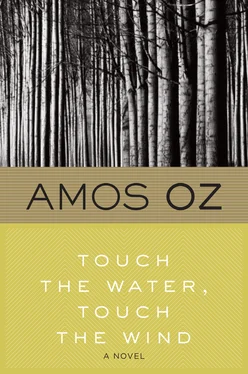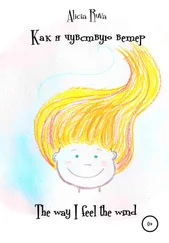So they exchanged melodies.
Eventually Pomeranz reached up to the sky with a long bony arm and a transparent hand, pushed the moon aside and scattered a handful of stars over the darkening disc. Then he turned and went his way in peace into the clasp of the distant cricket song into the heart of the jackals' howling in the mountains.
Ernst, the Secretary of the Kibbutz Council, occasionally used to say:
"There's no smoke without a fire — the proverb presumably knows what it's talking about and who am I to pick a quarrel with an ancient proverb, but on the other hand the proverb doesn't say that whenever there's a fire the smoke has to appear at once or indeed at any stage whatever."
(Ernst was in the habit of saying this or something like it whenever in the course of a meeting or debate anyone was carried away and resorted to excessively emotional arguments.)
Then something happened.
Elisha Pomeranz, a modest, retiring shepherd living in a kibbutz in the north of the country, has unexpectedly published an important article in a leading foreign scientific periodical. The article is by no means modest or insignificant: according to the headlines in the evening newspapers he has succeeded in solving one of the most baffling paradoxes connected with the mathematical concept of infinity.
It was a sensational event. The newspapers even told of the storm of excitement in the most remote centers of learning. Generations upon generations of scholars had broken their heads against the paradoxes of mathematical infinity, had muttered about the limitations of the human mind, had trembled as their thoughts tentatively probed the utmost limits of knowledge and encountered the frosty depths of the universe, adopted a tone of resignation in the face of the silence of eternal mysteries, and had always concluded: thus far and no farther. No one could ever cross this final line without collapsing into contradiction, absurdity, mysticism, ecstasy, or madness. This line marked the final limit of reason and the threshold of silence.
And now, to universal astonishment, a simple amateur, an outsider, working alone in a remote, out-of-the-way village, with the aid of nothing but pencil, paper, and solitude, had probed and hunted and suddenly come up with—
— an astounding theorem.
— a simple solution.
— a crystal-clear answer.
— breathtaking.
Not long afterward a gleaming black car drew up outside the hut which housed the kibbutz office. From it emerged a pair of elegantly dressed men. They were sinisterly alert. They inquired where they could find Pomeranz, if indeed such a man existed and he was not merely a trick or a delusion.
Ernst told them that at that time of day he was generally to be found in the pastures, and to the pastures they both disappeared at once in their black car. They were both well groomed, ostentatiously fresh looking, with wide American ties held in place by fine silver clips, and at the same time there was something daring about the cut of their suits, they wore cowboy-style belts or something of the sort and here and there there was a faint touch of the bohemian about them.
The determined visitors searched around for Pomeranz but they did not find him, because he was sometimes in the habit of taking his flocks across the wadi into the tangle of shallow gulleys, or up the rocky slopes among the boulders into the shady recesses of the olive plantation. The entire landscape, hills and valleys, the bluish mountains on the horizon, the hayfields in the plain, everything was veiled in a slight mist, and there was not a soul to be seen.
Alert man A said to alert man B:
"He's set the whole world buzzing and now he's lost some where in this goddam silence."
Alert man B displayed a cautious smile, replaced it and answered:
"As soon as you said silence, goddam silence, I could hear the sound of an animal, a barking perhaps, and there's a rhythmic throbbing noise on the other side of this hill."
While they were talking in the open country, waiting, leaning on their magnificent car, pink and clean-shaven, exuding an air of infinite prospects and possibilities, bursting with arrogant, energetic enthusiasm, shattering the calm of the hills and plains by their very presence, devising their strategy and rehearsing the division of roles in the forthcoming conversation, while they lay in wait for Elisha — at that moment the telephone in the kibbutz office began ringing repeatedly and incessantly. Excited voices inquired indefatigably who he was and what he was like, what his weaknesses and his hobbies were, what his timetable was, when could they meet him, get to know him, make friends with him, interview him, chat with him, et cetera. Some of them were confident and blustering, some were honey-sweet, some were foreign, there were the skinny, bitter women of the international press, and wheedling women, a vast multitude. Nor was there any end to the flood of letters asking for advice, ideas, autographs, solutions, engagements, special tiny favors, and above all for usable photographs of Elisha Pomeranz against a background of fields or vineyards, llrgently: the whole world was standing and holding its breath, and time was of the essence.
In the thickly wooded basin of the Black Country to the north of the town of M — there stands a tiny hamlet. It appears as though it can only exist by favor of the dense forest which seems to have made a momentary concession, to have opened up slightly to yield a small patch of plainland and a winding length of stream, an old wooden bridge, and once again closed in round about.
At the foot of this hamlet spreads a green meadow where cows graze in everlasting peace. Hay wains groan their way like pregnant women up the hill, struggling in the black mire. Beside them walk peasants carrying pitchforks, and they lend a shoulder as the need occurs.
In the middle of the hamlet among the dingy crooked hovels runs a mild, hesitant stream. The time is mid-afternoon: three o'clock or perhaps four. By the side of the stream sits a lean angler, bent forward. He has been sitting here since early morning, since before sunrise. His rod has fallen asleep in his hand, he has a hat made of folded newspaper on his head, his blue eyes stare blankly at the water, the hills, the forest opposite. His pose expresses idiocy, as does his fixed stare; his mouth gapes, a drop hangs from the tip of his nose, his lower jaw sags. The old man is as blank as a wall, but the plains the forest the stream all flow fearlessly all day long into his eyes and find room enough within.
On the opposite bank dusty peasant women with headscarves and spreading skirts chew endlessly on mint leaves or quids of tobacco and shoot out jets of yellow juice. They move on all fours, scratching potatoes out of the ground. And all the time, without the slightest whisper, the low gray sky arches oppressively over the hamlet and meadow. The small church reaches up on tiptoe toward the sky with its two towers, one ruined, the other unfinished. The church is entirely built of thick, blackening boards, and since it leans toward the south on account of the strong northerly winds it is propped up with four roughhewn slanting logs. The nails which once held them in place have long since rusted away, and the church is supported by inertia, equilibrium, exhaustion.
In front of the church there extends a small, rough-paved square, sagging toward the middle. When the building finally falls the square will enfold the remains and weeds will sprout up between the flagstones to consume everything in oblivion.
On the edge of the square a pair of ancient horses stands motionless, like statues from an equestrian group whose riders have been hacked off in the course of some political unheaval or change of heart. But the two horses, however old, are still alive. And motionless.
Читать дальше

![Хироми Каваками - Strange Weather in Tokyo [= The Briefcase]](/books/29150/hiromi-kavakami-strange-weather-in-tokyo-the-br-thumb.webp)










